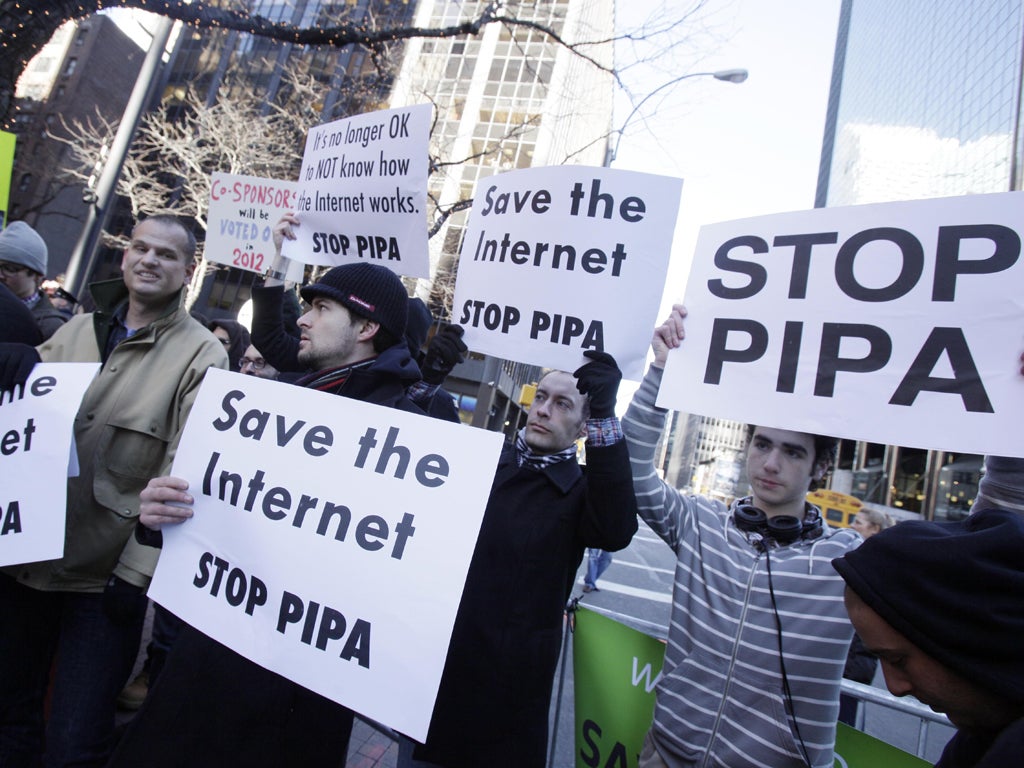Is Wikipedia winning the war? US Senate slips into reverse after blackout day
Support for new web laws recedes after backlash on the internet

The backlash against two bills aimed at stopping online copyright infringement gathered pace last night, as eight US lawmakers announced that they had withdrawn their support for the measures.
Stung by claims that it would disrupt free expression and harm the internet, two key sponsors of the US Senate's Protect Intellectual Property Act (Pipa), Marco Rubio of Florida and Roy Blunt of Missouri, announced that they would no longer be backing it.
Mr Rubio, a highly regarded Republican freshman who is seen as a future presidential contender, wrote on his Facebook page that he had decided to perform the U-turn after hearing "legitimate concerns" that the bill was overly draconian.
Mr Blunt said this week's protest by websites such as Wikipedia, which went dark on Wednesday, had prompted his move. "The right to free speech is one of the most basic foundations that makes our nation great and I strongly oppose sanctioning Americans' right to free speech in any medium," he said.
Two other, previously supportive senators, Orrin Hatch of Utah and Ben Cardin of Maryland, also jumped ship. Their volte-face means that Pipa, which once looked likely to sail through the Senate with bipartisan support, is now in serious trouble.
In the House of Representatives, three Republicans and one Democrat announced that they would now be voting against the Stop Online Piracy Act (Sopa). One of their number, Dennis Ross of Florida, said that: "as a true free marketeer, I want IP protected correctly." The sudden change in political winds reflects the huge success of Wednesday's protest, which was joined by an estimated 7,000 websites, including Google, Wordpress, and Craigslist. More than 4.5 million people put their names to a petition against Sopa.
Wikipedia said that its "blackout" had been a game-changer. It said: "More than 162 million people saw our message asking if you could imagine a world without free knowledge. You said no. You shut down Congress's switchboards. You melted their servers. Millions of people have spoken in defence of a free and open internet."
The online encyclopaedia's founder, Jimmy Wales, was anxious to stress in interviews that the bills had not yet been beaten, but few lawmakers are likely to risk inflaming public opposition during this election year, regardless of how cannily they are lobbied for support.
Both once-obscure bills were crafted by such powerful organisations as Hollywood film studios and trade unions and the US Chamber of Commerce. Their official purpose is to hit back against online piracy on internet sites hosted overseas.
Opponents say they amount to censorship of the internet. In theory, the bills make it illegal for sites such as Google and Wikipedia to link to sites that host even tiny amounts of pirated content. And they could also force internet service providers to block access to certain addresses.
That means they could see a swath of hapless internet users fined or imprisoned, opponents claim. Even Lamar Smith, the Republican congressman from Texas who wrote Sopa, might fall victim himself; his campaign website was reported to be carrying an uncredited landscape photograph yesterday. Although he swiftly removed it, that would not be enough to stave off prosecution under his own law.
Supporters of the bills insist that their proposed legislation is being misrepresented. Chris Dodd, a former Democratic politician who leads the Motion Picture Association of America, the film industry's leading lobbying organisation, branded this week's protests "irresponsible" and "an abuse of power".
Subscribe to Independent Premium to bookmark this article
Want to bookmark your favourite articles and stories to read or reference later? Start your Independent Premium subscription today.

Join our commenting forum
Join thought-provoking conversations, follow other Independent readers and see their replies